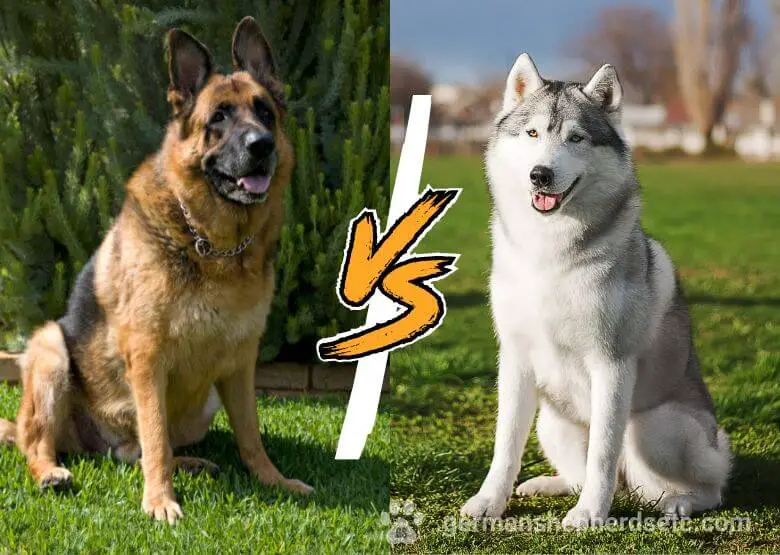Table of Contents
If you want to get a great dog for your household and family, consider German Shepherd vs. Husky breeds. Both dogs are amazing, but they differ in appearance, temperament, and character. You may also want to know their health and care needs and what to expect from their exercising, training, and socializing.
You can wonder how much a German Shepherd or Husky puppy may cost. The average prices range from $1,000 to $2,000 if you take a dog from a reputable breeder. Of course, the price will be much higher if you want to buy your pet from an award-winning bloodline.
Therefore, we have compiled this GSD vs. Husky comparison to help you make the right choice.
History of the Two Breeds
Both German Shepherds and Siberian Huskies belong to working lines. Though, the origin of these breeds is pretty different.
The first German Shepherd dog appeared in Germany, where it was bred for herding. The breed was formed within 35 years, and now it is considered the second most popular registered breed in the AKC, after the Labrador Retriever. Shepherds are very intelligent and strong dogs that have been used for working in the police, military, search and rescue, guidance, and protection services.
The Husky originated from Siberia, and it is one of the oldest dog breeds that were meant for sledding and carrying loads to long distances by the Chukcha people. Huskies played a great role in people’s survival in the extreme Siberian cold, and they are known to save many lives. For example, the Husky dogs carried medicine against the diphtheria pandemic in 1925 to the remote settlements of the people in the Nome area in Alaska. The sledding team of dogs managed to run 658 miles in about six days to deliver the lifesaving preparations to the town. In the AKC’s list, the Husky occupies the 12th position by popularity.
German Shepherd vs. Husky Appearance and Character
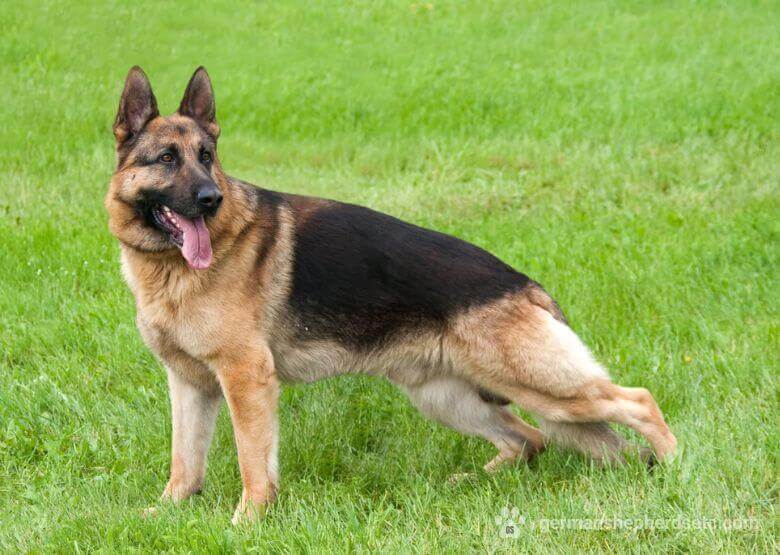
Both dog breeds are very handsome. Their appearance has some distinctive characteristics that are considered signs of the breed.
German Shepherds are a bit larger. They are approximately 22-26 inches (56-66 cm) tall, and their average weight is 50-90 pounds (22-41 kg). The Siberian Husky is about 20-23.5 inches (51-60 cm) tall and 35-50 pounds(16-23 kg) heavy.
Their coats are very similar, too. They are double-layered and cold-resistant. The two breeds are heavy shedders, especially in spring and autumn. The color of the coat differs. The most widespread shades for Shepherds are black and tan, solid black, black and red, black and silver, sable, and grey. The variety of Husky’s colors is even wider. The most well-known colors are grey, silver, white, piebald, sable, copper, brown, black, black and tan, splash, black and white, red, and agouti.
German Shepherds boast a heavy, muscular, and lean build, erect ears, and keen dark eyes. Huskies are more compact, with their bodies proportionally shaped. They have long bushy tails, expressive blue or brown eyes, and erect ears.
If we compare the temperaments of a German Shepherd dog vs. a Husky, they are both good family dogs. They are very active and energetic, and Huskies are even more lively and restless. German Shepherds are very intelligent, but also very sensitive. They hate to be left alone for a long time. They also want to please their owner, so your doggy can bring you slippers or a newspaper and be very happy about it.
A German Shepherd is always on guard duty. So, it may be pretty suspicious, barking loudly at every strange sound or move outside the house. A GSD is a pet for one owner, and it may be aloof to other family members.
As for a Husky, it is also very smart but mischievous. It can become extremely bonded to all the family and, like a German Shepherd, hate staying alone in an empty house. This extremely sociable pooch needs companionship all the time. However, apart from your family, it will be friendly and lovely to everyone who enters the house or even to strangers in the street. That is why Huskies are not the best guard dogs in the world. They can welcome would-be intruders heartily.
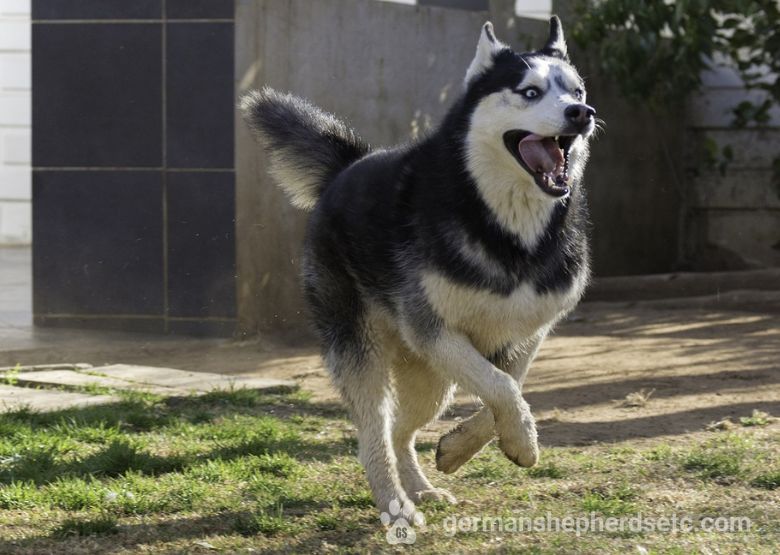
On the other hand, your Husky will need to be the center of attention and get involved in family activities all day round. It can be overzealous while greeting people, so it needs proper training to avoid that. Huskies bark pretty rarely, but they are very talkative. Your pup will howl or sing, communicating with you with different sounds day and night.
Therefore, both breeds can make perfect family dogs but, if you don’t have much time, such dogs may not suit you. Both animals have particular requirements for their owners, so you need to comply with them.
Health, Feeding, and Care
Both breeds produce healthy and energetic dogs if properly cared for. However, if we compare the lifespan of the German Shepherd vs. Husky breeds, a GSD lives shorter – about 8-10 years on average, while a Husky’s lifespan is between 12 and 14 years.
Nevertheless, it is strongly recommended to adopt your purebred dogs from reputable breeders so that you ensure that your pet will live a healthy and happy life. You should show your pup to a veterinary first, even if it has all the necessary certificates provided by the breeder.
The most severe health issue your German Shepherd can suffer from is elbow and hip dysplasia. It shows up in many dogs at the adult age. The condition is caused by the incorrect formation of joints that get loose over time. This can lead to very painful arthritis and disability.
German Shepherds can also suffer from degenerative myelopathy. It is a result of the damaged spinal cord, and it impacts the dog’s coordination heavily. One more life-threatening condition, that can also occur in most large-breed canines, is bloat. So, you should be very careful with your pet’s diet and times of feeding. Try to feed your dog at least twice per day because, if it is too hungry, it may eat fast and experience bloat.
Huskies can also suffer from hip dysplasia, but such a condition occurs in these dogs more rarely. The true problem of Huskies is different eye issues, including cataracts. That is why ophthalmologist testing is recommended when you adopt this pup. Progressive retinal atrophy is also an eye issue that can lead to blindness.
Healthy feeding from an early age can help prevent health issues in both Huskies and Shepherds. Feed your dog twice or three times per day with 3-3.5 cups of high-quality kibble. The food should be specific to your pet’s age and size. Check the dog’s weight regularly because both under weighting and over weighting can cause health issues.
You need to be sure that your dog’s food has meat in it but not those unnecessary components that include soy, corn, or wheat. Raw natural diets can also be good for both breeds. Do not expose your pet to a low-calorie diet unless it suffers from joint dysplasia. Your Husky or German Shepherd are very energetic dogs, and they need a lot of calories to be healthy and happy. Keep a bowl of fresh water at your dog’s reach all the time.
Other care requirements are related to grooming. Both the Husky and German Shepherd have double coats, so they are heavy shedders. The Husky’s coat is much softer than that of the German Shepherd. Nevertheless, when we speak about GSD vs. Husky, they both need brushing 2-3 times per week. Remember that during shedding seasons, you may need to brush your pet every day if you want to avoid the full mess in your household.
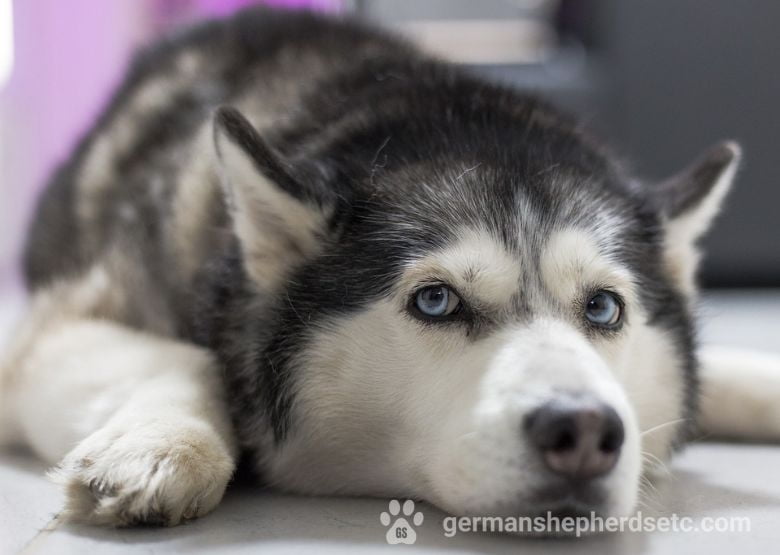
Another recommendation concerns bathing. Do not do it too often because the dog’s skin has natural protective oils, and frequent bathing can damage their levels, causing allergies and other skin problems. If your German Shepherd is often exposed to mud and debris (and they often are), you can bathe it not more often than once every 8 weeks, but with special dog shampoo only.
As for the Husky, they are known as self-cleaning dogs, needing a bath only a few times per year. Neither a German Shepherd nor a Husky has a strong dog odor, so you can bathe them only if they need it badly.
You should also think about keeping the pet’s nails trimmed and ears and teeth cleaned as an essential part of the care program. If you do not know how to do it properly, ask your vet or seek help from experts.
Exercising and Training
As we compare the German Shepherd vs. Husky, we can say that both breeds are very energetic and active, so they need a lot of exercises. Mental stimulation also makes them happy. Huskies are even more active. On the other hand, if not socialized properly, these dogs can become unpredictable and even dangerous. The thing is that both Shepherds and Huskies are very strong. Being a protective breed, GS dogs are well-known for their bite force. It is 238 psi. However, Husky’s bite force is even stronger – 320 psi. So, you can understand that proper training and exercise are a must for these dogs.
Nevertheless, German Shepherds require less exercise than Huskies. 60 minutes per day is enough to keep them fit and engaged. These dogs prefer the combination of physical exercises with mental stimulation, like in agility courses, or while playing different games. Fetch or frisbee is very good and interesting for them.
Huskies need at least 90 minutes per day. Their exercises should include long walks and runs, so they can become the best jogging partners. If it is snowing, they can go sledding because this breed feels very comfortable with pulling carts and sleds.
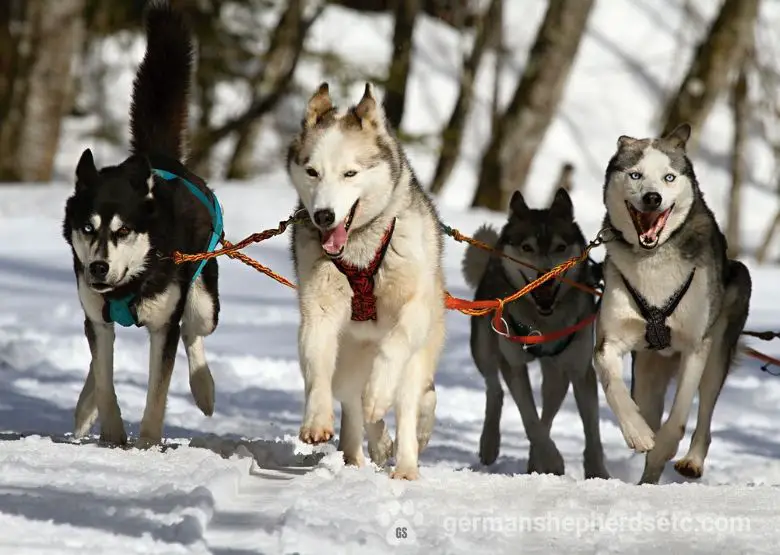
Both dogs are well-known for their ability to jump fences, so even a 6-foot fence is not an obstacle for them. If you decide to adopt a pet belonging to one of these breeds, ensure that the fencing around your backyard is high enough. German Shepherds can even attack strangers in the street when they escape, while Huskies just run off to the horizon and disappear.
German Shepherds can run very fast because they were bred as herding dogs. The top speed for them is about 30 miles per hour. Siberian Huskies were bred as sledding and carting dogs, so they run a little more slowly, reaching a maximum of 28 miles per hour. However, such speeds need to be trained and managed in both breeds.
When we look at German Shepherd dog vs. Husky training needs, we will see that German Shepherds are remarkably trainable. This trainability accounts for using these dogs in protection, police, and military services, as well as in search and rescue missions.
GSDs can be easily trained for crates and walking in a harness, too. They need a lot of socialization from a very young age. This training is important for them to ensure that they are not overprotective and cannot be hazardous to strangers and other animals in the neighborhood.
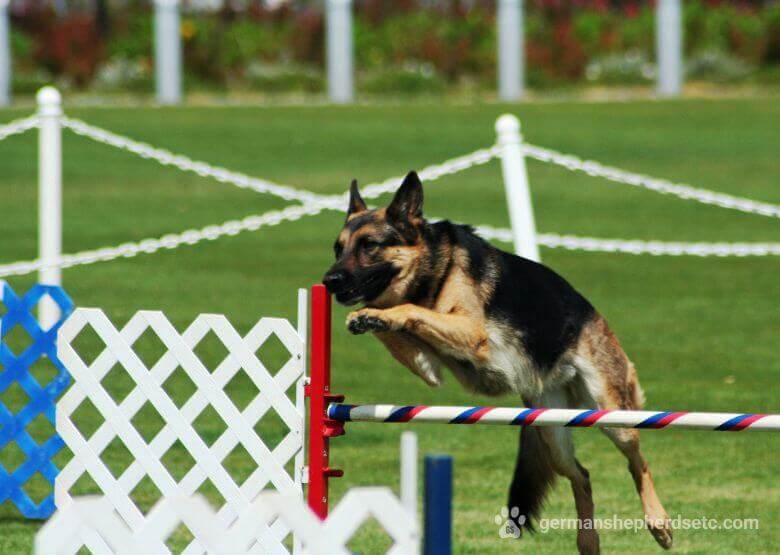
Huskies are mischievous and overzealous, so socialization for them means learning how to play a fair game and react to other people and animals properly. Unlike German Shepherds, they do not demonstrate aggression but rush to leak, jump, and play around with every potential intruder. Teaching them not to do that and differentiate threats is a challenging task.
All in all, you need to be firm, patient, and persistent while training these dogs. If you are a first-time owner, such pets may be difficult to manage. So, you should ask an expert trainer or an experienced dog keeper for help and advice.
Final Thoughts
Thus, this comparison of German Shepherd vs. Husky dog breeds has shown that they both can make excellent family dogs. However, these pets are very specific in their needs, so they may not be suited to every owner. It is pretty important to learn a lot about their characteristics and peculiarities beforehand if you have decided to adopt one of them as your pet and companion. We hope that we have provided enough information in this article to help you make the right choice.
If you cannot decide which of these two breeds to give preference to, you may consider a Gerberian Shepsky. It is a cross-bred pup of a German Shepherd and a Siberian Husky. They are the newest dogs in designer breeding. They are very intelligent, strong, and simply the cutest pups on Earth.
